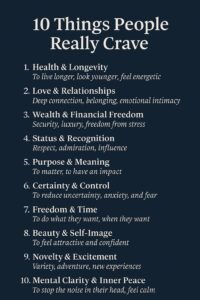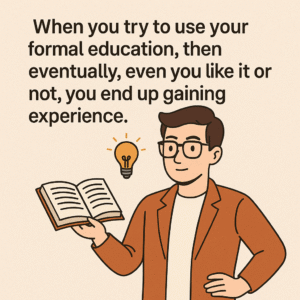
Introduction
After years of talking with students, career changers, and professionals—many of whom were top performers, I’ve realized something unexpected about job searching:
It’s not always about how good you are.
It’s about how likely you are to get picked.
This realization changed the way I guide people in their career strategy. Because once you understand the system, not just the skillset, you stop wasting effort in the wrong places.
The Overlooked Reality: Talent Isn’t Always the Bottleneck
Most people applying for competitive roles are smart, skilled, and hard-working. So why do so many still get ghosted or overlooked?
Because the job market isn’t always a meritocracy, it’s a selection process.
And when thousands apply for one role, the odds are shaped by more than just credentials.
Before you hit that “apply” button, ask yourself:
“What is the probability I’ll actually get this job?”
This question isn’t meant to discourage you, but to help you apply smarter, with less frustration.
Why This Matters: Limited Openings, Unlimited Applicants
The reality is simple: there are far more applicants than roles.
Your strategy must go beyond submitting a polished resume. It must involve probability thinking, a way to assess whether you’re positioned to stand out.
Why is this important? It enables you to optimize your time, allowing you to concentrate on pursuits that are truly worthwhile and beneficial to you.
That’s why I created this 5-question framework to help you evaluate your chances before applying.
Five Questions to Ask Before Applying for Any Job and the Rating System – Make sure you exceed a total of at least 70%.
These questions are based on real-world hiring patterns, applicant tracking systems (ATS), and human psychology in recruitment.
- Do My Skills Match the Job Enough to Beat the ATS?
In my view, we can currently allocate: 10%
Why did I allocate 10%?
Most applications are filtered by software before a human even sees them.
Ask yourself:
- Does your resume match the job description keywords closely?
- Are your titles, skills, and metrics aligned with the posting?
If not, your application may not move past the initial digital screening, regardless of how well you prepared your resume. A person will eventually make the final decision, but the process gets more complex from here. Let’s keep the rate at 10%.
- What Are the Odds I’m Uniquely Qualified?
In my view, we can currently allocate: 50%
Why did I allocate 50%?
You’re not just applying, you’re competing.
Ask:
- How many other applicants have similar or better credentials?
- Do I offer a rare combination of skills or experience?
- Is there something that makes me hard to replace?
When you possess a unique qualification for a position, your value can surpass that of other candidates. For instance, if you are the sole individual capable of constructing a cargo ship powered by sea water, the outcome is evident. This is why I have assigned a 50% weighting to this criterion.
Recruiters are not just looking for qualified, they’re looking for fit + distinction.
3. Will I Build Stronger Rapport Than Other Interviewees?
In my view, we can currently allocate: 15%
Why did I allocate 15%?
If you get to the interview stage, your technical fit is already established. Now the question becomes:
- Can you connect with the team?
- Do you demonstrate emotional intelligence, curiosity, and alignment with the company’s culture?
- Can you make the interviewer feel understood?
You may be curious about the rationale behind setting the threshold at 15%. Consider a scenario where you are the sole candidate for the position; in this case, the hiring team has limited options and will focus primarily on your communication skills and overall fit. Even if your verbal communication is not strong, your chances of selection remain high. However, it is essential that you can effectively collaborate with a team and demonstrate professional behavior.
4. Do I Have an Insider or Advocate?
In my view, we can currently allocate: 15%
Why did I allocate 15%?
Internal referrals often improve a candidate’s visibility and perceived reliability. While this may seem unfair at times, referrals reflect a practical hiring reality—employers tend to reduce risk by trusting recommendations from those already inside the organization. This does not guarantee a hire, but it can create a notable advantage in competitive processes.
Ask:
- Do I know anyone inside the company?
- Do I know anyone inside the company: a colleague, family member, or friend—who could support my application?
- Have I built a relationship with someone who can nudge my application forward?
If not, could you start building one before applying?
The reason this is set at 15% is that having an internal advocate can significantly influence your chances of being hired. For instance, if you have a family member or close contact already working at the company, their support could help guide your application through internal channels. This influence, while informal, can make a difference when the hiring team is looking to reduce uncertainty or move quickly. If they recruit you for their own team, they can encourage other team members—who may interview you—to support your selection. This doesn’t end here, it can continue in countless ways, including through friends of friends and beyond.
5. Can I Build Any Personal Connection to the Hiring Manager?
In my view, we can currently allocate: 5%
Why did I allocate 5%?
Most applicants remain just a name on the list. But if you can create a genuine interaction—through thoughtful outreach, shared interests, or value-adding communication—you humanize your application.
Ask:
- Have I engaged with this hiring manager’s work online?
- Have I contributed something useful or relevant to their team?
- Have I done anything that makes them pause and say, “This person stands out”?
Everyone appreciates being valued and validated, including hiring managers. It makes sense to consider candidates who recognize the strengths of others and demonstrate the necessary skills for the role. However, hiring someone who does not provide a tangible benefit to the team is not advisable. Therefore, I have weighed this criterion as 5%.
How to Use This Framework
Take a moment to rate yourself from 100 on each of the questions above for any job you consider. A sample snapshot from my Excel sheet is given below. You may create a similar version with ease. If your score is low across the board, you might reconsider applying—or you might see where to focus your effort first.

This exercise isn’t about limiting yourself.
It’s about protecting your energy, applying strategically, and giving yourself the highest chance of success.
Final Thought: Strategy Beats Effort
Effort alone doesn’t win the game—strategy does.
The smartest professionals don’t just submit more applications. They apply where their odds are highest, their value is clearest, and their presence is remembered.
If this perspective shifted how, you see your job search, let’s stay connected.
Sometimes, one question is all it takes to change your career path.
Disclaimer:
This blog post is for educational and professional development purposes only. It is not a substitute for personalized career counseling or job placement services.



